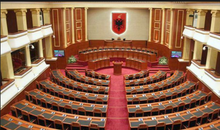
 Flash News
Flash News
Albanian-Macedonian sentenced to 12 years in prison for robbery in Tetovo, captured in Durrës
Lied to FBI about Charles McGonigal's connections, Former Diplomat Pleads Guilty
40-year-old arrested for stealing hospital employees' bags
International Atomic Energy Agency: Iran's main nuclear plants not hit
AMP punishes three "Eagles" officers, suspends them from duty
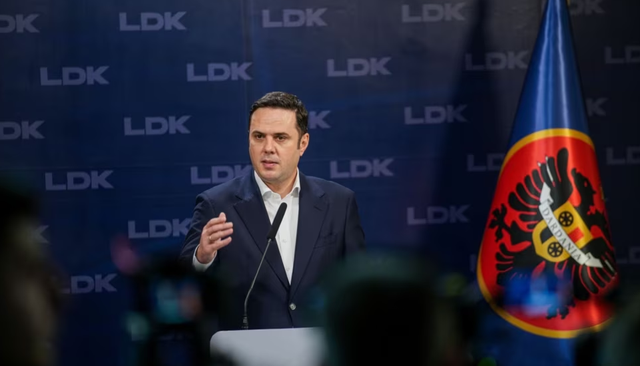
The leader of the Democratic League of Kosovo, Lumir Abdixhiku, unveiled on Thursday a 15-point agenda, based on which a unity government proposed by him would work, and which would include all other parliamentary parties.
Proposing the 15-point agenda as a way out of the political impasse, Abdixhiku said that "the national unity government is not a permanent solution, it is not the best possible one, but it is the responsibility that it necessarily bears for the current situation."
He said that this "is in the contract of honor between political forces and citizens to get the country out of the current crisis."
His agenda includes constitutional reforms, rebuilding partnerships with the European Union and the United States, increasing wages, and solving the energy crisis.
Abdixhiku's 15-point agenda
Point 1: functionalization of constitutional institutions and departmentalization of independent institutions.
Point 2: salary increases and implementation of the salary law.
Point 3: emergency package for managing the energy crisis.
Point 4: the start of the national project for gasification of Kosovo.
Point 5: rebuilding the partnership with the EU and the US and restoring an active foreign policy.
Point 6: voting on international agreements in the Kosovo Assembly.
Point 7: beginning the vetting process in the justice system.
Point 8: Starting projects of particular importance for the country.
Point 9: Constitutional amendments in the interest of institutional stability.
Point 10: drafting a national strategy for profound reform in education.
Point 11: institutional preparation for the Mediterranean Games.
Point 12: strategic security and defense reform.
Point 13: review of the municipal budget formula and necessary changes.
Point 14: preparation for free and fair democratic elections within 10 months.
Point 15: transparency and accountability mechanism for the transitional period.
Abdixhiku's proposal – announced long ago – comes as the country is plunged into a political crisis, unable to form new institutions even four months after the February 9 parliamentary elections.
This crisis comes because no party won the majority needed to govern alone.
Since April, MPs have gathered 30 times in the Kosovo Assembly in an attempt to constitute it, which is a necessary step towards creating a new government, but have repeatedly failed as the candidate of the incumbent Prime Minister's Vetëvendosje Movement, Albin Kurti, is failing to obtain the 61 votes needed to be elected speaker.
For this reason, the LDK has proposed the formation of a transitional government with all parliamentary parties, until the election of a new president in April next year.
Vetëvendosje has opposed this idea, the Democratic Party of Kosovo has said that it prefers an executive from among the parties that were in opposition last term. The Alliance for the Future of Kosovo also prefers such a coalition.
LDK had an offer from Vetëvendosje to form a governing coalition, but it did not accept it, and Abdixhiku repeated his opposition on Thursday.
"Because of the last four years, because of electoral pressures and because of the fundamental differences we have in values, this cooperation has been and is impossible," Abdixhiku said.
Deputies will meet again on Friday, in an attempt to form the Assembly.
Kosovo's President, Vjosa Osmani, reiterated on June 5 that the delay in the constitution of the Assembly harms the credibility of the institutions and the country's progress towards the Euro-Atlantic agenda.
Diplomatic representatives of the QUINT countries [United States, Great Britain, Italy, France and Germany] as well as the Head of the European Union Office in Kosovo, met a few days ago with the acting Prime Minister of Kosovo, Albin Kurti, requesting the rapid formation of institutions to ensure the well-being and prosperity of the citizens of Kosovo. /REL
Latest news

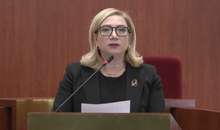

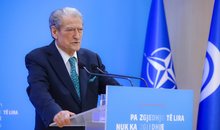
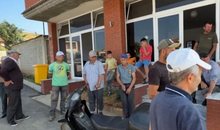
Maliq farmers protest
2025-06-13 13:03:07
KAS accepts the DP's request, decides to recount the votes in Gramsh and Peqin
2025-06-13 12:46:14


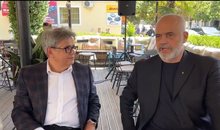
Bennett who sealed the political "deflowering" of SPAK
2025-06-13 12:21:27
Lied to FBI about Charles McGonigal's connections, Former Diplomat Pleads Guilty
2025-06-13 12:10:56
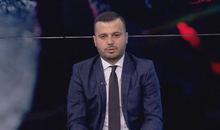
The strange world of justice
2025-06-13 11:55:10
SPAK reports today to the GJKKO the two-month investigation into Erion Veliaj
2025-06-13 11:39:30

40-year-old arrested for stealing hospital employees' bags
2025-06-13 11:21:09

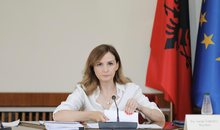
Tabaku: We cannot behave like Europeans in Brussels and like autocrats in Tirana
2025-06-13 10:49:00
International Atomic Energy Agency: Iran's main nuclear plants not hit
2025-06-13 10:36:12
AMP punishes three "Eagles" officers, suspends them from duty
2025-06-13 10:28:13
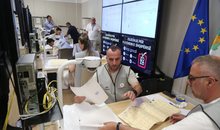

Flights in the Middle East canceled after Israeli airstrikes on Iran
2025-06-13 09:53:02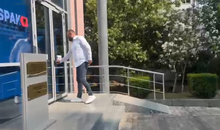
Halit Valteri appears in SPAK, why was he summoned?
2025-06-13 09:39:50


These Horoscope Signs Will Have Lots of Luck During the Summer
2025-06-13 09:13:00

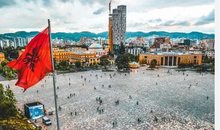

What are Iran's nuclear ambitions and why are they so controversial?
2025-06-13 08:38:03
Donald Trump convenes cabinet after Israeli attacks on Iran
2025-06-13 08:24:44
Foreign exchange, the rate at which foreign currencies are sold and bought
2025-06-13 08:16:58
Albanian investments abroad slowed down in the first quarter of the year
2025-06-13 08:06:34
Çfarë ndodh në organizëm nëse hani një thelpi hudhër në darkë
2025-06-13 08:00:48
Israel attacks Iran, targets nuclear plants and military commanders
2025-06-13 07:46:14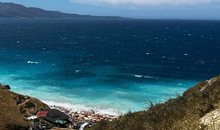
Temperatures up to 36 degrees, as the weather forecast for today
2025-06-13 07:33:10
Horoscope June 13, 2025, what the stars predict
2025-06-13 07:15:37
Morning Post/ In 2 lines: What mattered yesterday in Albania
2025-06-13 06:59:27
Car goes off the road on the "Tirana-Lezha" axis, 4 injured
2025-06-12 23:03:47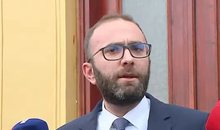
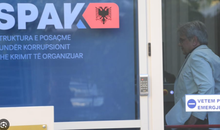
Document/ Benet Beci was taken into custody by SPAK before the elections
2025-06-12 22:52:12








Montenegrin Army to train Ukrainian soldiers
2025-06-12 20:13:45
Italia në alarm, zgjebja po përhapet me shpejtësi
2025-06-12 20:11:39

Dua Lipa gets engaged: I'm happier than ever with Callum Turner
2025-06-12 19:44:29

Around 29,000 Albanians left last year, INSTAT estimates
2025-06-12 19:31:23

Rama "sacrifices" the socialists to make fun of Soros
2025-06-12 19:13:33
Montenegrin Army to participate in EU military assistance mission to Ukraine
2025-06-12 18:57:36

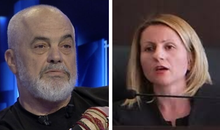

Body acne, six ways to prevent it
2025-06-12 18:05:03

State Matura 2025, foreign language exam grades published
2025-06-12 17:31:26
Video/ This is the moment the Air India plane crashes with 242 people on board
2025-06-12 17:27:59
GJKKO postpones the hearing for 'Golden Bullet' to June 17
2025-06-12 17:23:50
The decline of democracy in Albania, the alarm from the European Parliament
2025-06-12 17:03:38
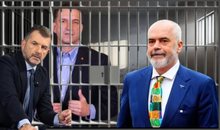
What does the murder of Superman Veliaj reveal about May 11?
2025-06-12 16:40:53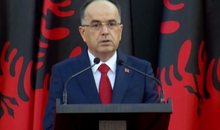


UN report: Europe is surrounded by a belt of countries in crisis
2025-06-12 16:08:47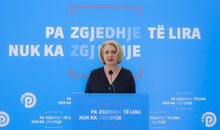
Sula: The scandal with the state matura, a failure of the education system
2025-06-12 16:08:42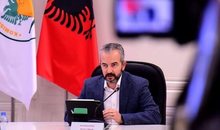

'I have no affection', Erion Isai separates from his wife
2025-06-12 15:40:38


On the 84th anniversary, the SP is ever bigger, Albania is ever smaller
2025-06-12 15:07:25
A "lazy day" a week can reduce stress and stroke risk
2025-06-12 14:56:30

Tragic in Fier, 28-year-old found dead in the yard of his apartment
2025-06-12 14:39:15
How does temperature affect body composition?
2025-06-12 14:33:18
Throwing company waste into the Buna River, 31-year-old employee prosecuted
2025-06-12 14:30:11
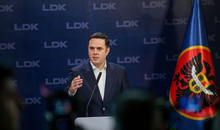
LDK's Abdixhiku unveils 15-point agenda for a unity government
2025-06-12 14:14:24
From shootings to stabbings/The history of deadly school attacks
2025-06-12 14:11:51
3 Albanians, part of criminal organizations, extradited to Italy
2025-06-12 13:59:15
A 26-year-old man is arrested for the armed conflict in Ali Dem
2025-06-12 13:40:31
Report/ Albania worsens in gender equality index
2025-06-12 13:40:14

Quarrel between neighbors in Patos, 35-year-old injured with screwdriver
2025-06-12 13:07:05

Accident on the Krahes-Memaliaj axis, a 65-year-old man is injured
2025-06-12 12:45:49


Demand a recount of votes in Tirana, the Court dismisses Alimehmet's case
2025-06-12 12:22:08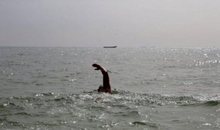
Suffering cardiac arrest, vacationer dies on Qerret beach
2025-06-12 12:05:48